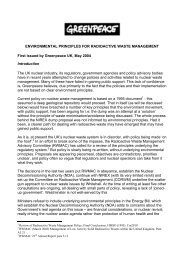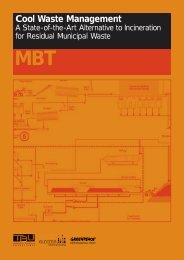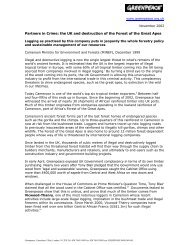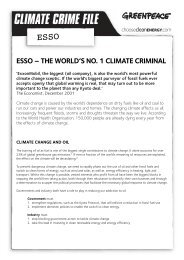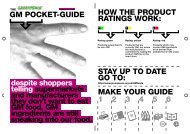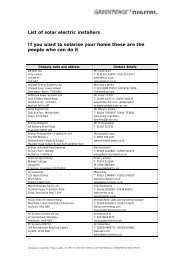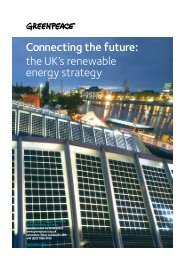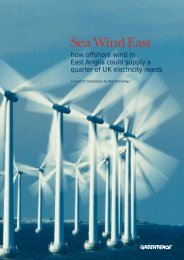EXXON'S WEAPONS OF MASS DECEPTION - Greenpeace UK
EXXON'S WEAPONS OF MASS DECEPTION - Greenpeace UK
EXXON'S WEAPONS OF MASS DECEPTION - Greenpeace UK
Create successful ePaper yourself
Turn your PDF publications into a flip-book with our unique Google optimized e-Paper software.
EXXON’S<br />
<strong>WEAPONS</strong> <strong>OF</strong> <strong>MASS</strong><br />
<strong>DECEPTION</strong><br />
THE ASSESSMENT <strong>OF</strong> GREENPEACE<br />
INTERNATIONAL
CONTENTS<br />
FOREWORD BY BIANCA JAGGER<br />
CHAPTER ONE: PULLING STRINGS IN THE REGIME<br />
CHAPTER TWO: SUBVERTING THE WILL <strong>OF</strong> THE UNITED<br />
NATIONS – IPCC SABOTAGE AND THE STOCKPILING <strong>OF</strong><br />
SCEPTICS<br />
CHAPTER THREE: <strong>MASS</strong> DESTRUCTION <strong>OF</strong> ECONOMIC<br />
REALITY<br />
CHAPTER FOUR: THE DIRTY WAR – REPRESSING INTERNAL<br />
DISSENT BEFORE RESOLUTION 98 AND KYOTO
FOREWORD<br />
BY BIANCA JAGGER<br />
As I write this foreword, politicians from 178 countries are gathered in New Delhi for the<br />
latest round of international talks to tackle global climate change. It was from earlier rounds<br />
that the Kyoto Protocol struggled to life, but more, much more is needed.<br />
As long as a decade ago a multi-government panel warned the impacts of global warming<br />
would be “second only to nuclear war”. If the men and women gathered in India, and their<br />
successors in future talks, cannot agree deep cuts in greenhouse gas emissions, global<br />
warming will spread a rising tide of economic and environmental devastation across nations<br />
with even greater destruction than waves of B-52s.<br />
Their predictions are already coming true. The citizens of the drowning Pacific atoll nation<br />
of Tuvalu, are packing their bags to leave their homeland for New Zealand. As long ago as<br />
1993 they accused the industrial nations of “cultural” genocide because of our fossil-fuel<br />
profligacy.<br />
As citizens of this planet, we are each reliant on our governments’ representatives at the<br />
climate talks. But in amongst these delegates are powerful agents with vested interests who<br />
continue to wage a cynical, self-interested war to derail this vital process. The worst of these<br />
are the men from ExxonMobil. Never mind the millions killed by drought and disease,<br />
never mind the homes wrecked by floods, never mind the storms, never mind the extinction<br />
risk to species like polar bears, as far as Exxon is concerned, US corporate life is not up for<br />
negotiation.<br />
The climate change negotiations have sustained a ten-year, systematic attack by the world’s<br />
largest oil company, known across Europe as Esso. Exxon’s war has resulted in a weak<br />
Kyoto Protocol then, under George W Bush, the ditching of it by the US government<br />
altogether. But still, Exxon continues in its efforts to sabotage what is left of the process.<br />
This dossier contains some examples of what has been revealed about ExxonMobil’s<br />
campaign against international climate action. But what don’t we know? What else has this<br />
company done that we haven’t uncovered?<br />
Esso is one of the most powerful companies on the planet. If their war against the Kyoto<br />
Protocol can be ended, there is a spark of hope for us to overcome the most serious<br />
environmental problem that our species has ever caused.
CHAPTER 1: PULLING STRINGS IN THE REGIME<br />
When President Bush announced that the US would be pulling out of the Kyoto<br />
Treaty in March 2001, the mark of the fossil fuel industry was all over his policy.<br />
One company stands out from the rest in its efforts to bring about Bush’s climate<br />
climb-down. For more than a decade, ExxonMobil (known as Esso in Europe) has<br />
been working consistently and systematically to derail any international action to<br />
tackle global warming. This corporation has made a concerted effort to turn its<br />
interests into government policy, steering the US away from international action,<br />
not only through direct lobbying but also through covert activities, funding and<br />
support for industry lobbying organisations and climate-sceptic scientists. The<br />
threat to security from global warming is profound, and ExxonMobil represents a<br />
clear and present danger<br />
In the words of Frank Sprow, ExxonMobil’s Vice President: ‘Companies that produce<br />
and use fossil fuels, oil, coal and gas, have a vested interest in the outcome of the climate<br />
change debate.’ None more so than ExxonMobil, which puts around $8 billion a year<br />
into oil and gas exploration and production and not one dollar into renewable forms<br />
of energy. While agencies such as the United Nations’ Intergovernmental Panel on<br />
Climate Change (IPCC) confirm that the implementation of international measures<br />
to reduce greenhouse gas emissions could have positive economic impacts, and<br />
respected investment analysts CLAROS found that Exxon would benefit from a<br />
more pragmatic attitude to global warming, the company itself obviously disagrees.<br />
CLAROS found that the company‘s ‘shareholder value is endangered because the<br />
opportunities ExxonMobil is missing and the risks ExxonMobil is exposing itself to<br />
are far greater than the risks the company faces from any likely policies to reduce<br />
emissions’. Nevertheless, the company continues to rely on the narrow energy base<br />
of fossil fuel production and seems prepared to stoop to any level to defend its<br />
outdated practices, rather than defending the planet. The methods it has adopted<br />
are detailed in this dossier.<br />
In April 2002 Dr Robert Watson was removed from the chair of the United Nation’s<br />
Intergovernmental Panel on Climate Change (IPCC). Dr Watson’s removal<br />
followed concerted lobbying by the Bush Administration at the behest of<br />
ExxonMobil. Watson had been a powerful voice in support of action to tackle<br />
climate change, and as the head of the UN’s global warming body he had sway over<br />
governments. Thus it was that ExxonMobil lobbied President Bush to remove<br />
Watson from his position. Within days of Bush entering the White House, a fax sent<br />
by Arthur G. Randol III, senior environmental advisor at ExxonMobil, was sent to<br />
the new administration. It was prefaced with a comment that he would ‘call to<br />
discuss the recommendations regarding the team that can better represent the Bush<br />
Administration’. The memo went on to specifically ask: ‘Can Watson be replaced at the<br />
request of the US?’ (See memo below). The answer, evidently, was ‘yes’. Exxon claims<br />
it was forwarding a previously written document on behalf of someone – a claim<br />
doubted, not least because the document is dated as written on the day it was sent.
Arthur ‘Randy’ Randol III – Exxon’s senior environmental advisor - writes to the<br />
White House soon after Bush takes power.<br />
He requests the removal of influential UN climate chief Dr Bob Watson. Bush<br />
obliges.<br />
In August 2002, four months after Watson’s removal, conservative groups which<br />
had been funded to the tune of more than $1million by Exxon, wrote to the White<br />
House congratulating George W Bush on his decision to not attend the<br />
Johannesburg Earth Summit. In startling language, the letter – leaked to an<br />
environmental group - urged the Bush administration to refuse to sign any new<br />
environmental treaties. It stated, ‘Even more than the earth summit in Rio in 1992, the<br />
Johannesburg summit will provide a global media stage for many of the most irresponsible<br />
and destructive elements involved in critical economic and environmental issues. Your<br />
presence would only help to publicise and make more credible their various anti-freedom,<br />
anti-people, anti-globalisation and anti-western agendas.’ The letter identifies lack of<br />
clean water as the most important environmental issue at the summit but adds:<br />
‘Conversely, the least important global environmental issue is potential global warming, and<br />
we hope your negotiators can keep it off the table and out of the spotlight.’ Defending the<br />
thirty-one groups that signed the letter, Esso <strong>UK</strong> Public Affairs Manager Gordon<br />
Sawyer wrote to The Times of London stating that ‘the organisations referred to are<br />
respected independent associations.’ Among the thirty-one signatories is the Freedom<br />
Alliance, set up by LtCol Oliver North. Another is the US National Anxiety Centre,<br />
which claims the UN has a 'socialist agenda' because it was 'created by diplomats from<br />
the former Soviet Union and US diplomats who were Soviet agents.' Its website describes
Islam as a 'bankrupt failure.' Another signatory is the Texas Eagle Forum whose 'A1'<br />
policy priority is to fight liberals 'who want to repeal the law against sodomy.'<br />
Groups funded by Exxon write to Bush congratulating him on not going to South<br />
Africa. They claim global warming is the ‘least important’ environmental issue.<br />
The groups include the CEI – funded to the tune of hundreds of thousands of<br />
dollars by Exxon.<br />
June 2002 saw a stark illustration of the power exercised by climate-sceptic business<br />
interests, when Bush dismissed a report written by the White House’s own<br />
Environmental Protection Agency (EPA). The report found that climate change is<br />
happening now, is caused by fossil fuels and, in a few decades, will impact on the<br />
US with increased droughts, sea level rise and more cyclones. The findings were<br />
drawn after input from NASA, the National Oceanic and Atmospheric<br />
Administration, the US State Department and the Energy Department. But Bush<br />
dismissed the report in a now infamous off-hand comment when he described the<br />
authors of the report as ‘the bureaucracy ’. The President’s refusal to accept the advice<br />
of his own scientific experts came after concerted pressure from climate-sceptic<br />
business interests. Exxon front groups - funded to the tune of hundreds of<br />
thousands of dollars (see funding document below) - were first to congratulate the<br />
President following his dismissal of the report.<br />
• The Competitive Enterprise Institute (CEI) told the New York Times that Bush<br />
dismissed the report, ‘because of concern from the right that he was going to accept<br />
the European environmental world view, that he had changed his mind as the report<br />
indicated he had.’ The CEI last year received $280,000 from ExxonMobil - and<br />
has received a similar sum for many years.
• The American Petroleum Institute (API) complained that its criticism of the<br />
science hadn't been incorporated in the EPA report. The API is chaired by<br />
ExxonMobil's Chairman and CEO Lee Raymond.<br />
• The George C Marshall Institute claimed that ‘much of that report has been<br />
thoroughly discredited by the scientific community.’ The Institute received $60,000<br />
from Exxon last year and has received thousands from the Global Climate<br />
Coalition, an Exxon front group.<br />
• Well-known climate sceptic, Dr Sallie Baliunas, claimed that ‘the<br />
Administration has no scientific basis for the climate report sent to the United<br />
Nations which states that human actions are to blame for recent global<br />
warming.’ In 1994 the Exxon and industry front group – Global Climate<br />
Coalition - hired a PR firm to take Dr Baliunas on a media tour. Through the<br />
Exxon-funded George C Marshall Institute, Baliunas has published several<br />
reports which attempt to show that human activities such as burning fossil<br />
fuels have no role in global warming, that science does not suggest dangerous<br />
climate change, and that scientific findings do not support federal regulation.<br />
Baliunas is an expert in astrophysics, not climate, and the reports were not<br />
subject to the peer review process.<br />
From Exxon’s website - details of funding recipients:<br />
The relationship between George W Bush and Exxon began when Bush was<br />
Governor of Texas, during which time Exxon was a key player in the weakening of<br />
state environmental regulatory policy on air quality. Bush was coming under<br />
increasing pressure from the public and environmentalists to close a loophole in the<br />
1971 Texas Clean Air Act, which effectively exempted the older ‘Grandfathered’<br />
power plants (responsible for 30% of the state’s industrial air pollution) from<br />
pollution control. Seeing an opportunity to paint himself green in the run up to his<br />
presidential campaign, but keen not to alienate his old colleagues in the oil and<br />
energy industry, Bush asked two oil company presidents – V.G. Baghini of<br />
Marathon Oil Company and Ansel Condray of Exxon USA – to draft a programme<br />
tailored to the needs of the industries involved. Baghini, Condray and Bush’s<br />
environmental director met in secret for the first six months of 1997 to develop a<br />
working proposal for legislation that would not disadvantage them. Their<br />
completed product – a completely voluntary scheme – became law in 1999,<br />
following a sham public consultation. As Bush’s democrat opponent in the 1998<br />
gubernatorial election, Land Commissioner Garry Mauro commented, Bush has<br />
‘given these polluters a corporate loophole they can drive a Cadillac through.’ Bush<br />
heralded his success in having achieved a major environmental policy without<br />
needing to resort to a ‘command and control’ approach. It was exactly the kind of<br />
policy that he would later propose in place of the Kyoto protocol’s binding<br />
emissions reduction targets. Sharing the platform at a press conference in January
1998 with Ansel Condray, Bush claimed that he already had 26 industry volunteers<br />
for his Clean Air Programme signed up. By the end of that year however, only three<br />
companies had actually reduced emissions, and then only by a sixth of the promised<br />
amount. Ansel Condray is now head of Esso <strong>UK</strong>.<br />
Bush’s route to office was paved with oil money, and Exxon gave more than any<br />
other oil company to the Republicans in 2000 – over $1 million. Of its total political<br />
donations for that year, 89% went to the Republicans.<br />
With the announcement of President Bush’s cabinet in January, it emerged that over<br />
half the members (including Vice President Cheney) were drawn from the oil and<br />
gas industry. Bush’s under secretary for Economic Affairs in the Commerce<br />
Department was the former Chief Economist for Exxon, Kathleen Cooper. Lobbying<br />
soon began in earnest to get Bush to withdraw the US from the Kyoto protocol. Two<br />
days before the President’s inauguration, Exxon published advertisements in the US<br />
press outlining its recommendations for ‘An Energy Policy for the New<br />
Administration’ which stated that ‘the unrealistic and economically damaging Kyoto<br />
process needs to be rethought.’ Another more recent advertisement declared that ‘the<br />
Kyoto Protocol would be a serious mistake’. Exxon gave $100,000 to Bush’s inaugural<br />
fund.<br />
Following Bush’s statement in March 2001 of his formal opposition to the Kyoto<br />
Protocol, the American Petroleum Institute – of which Exxon is a key player - wrote<br />
a letter of support to the Chair of the Energy and Air Quality Subcommittee,<br />
Congressman Joe Barton. Importantly, the letter indicated that the API had been<br />
asked by Barton for its view on the status of the international negotiations to<br />
implement the Kyoto protocol on 26 March, days before Bush’s climb-down.<br />
In October 2001, Mr Rene Dahan, Executive Vice President ExxonMobil, predicted<br />
that the long-promised US Government’s alternative to Kyoto, ‘will not be very<br />
different from what you are hearing from us’.<br />
On 22 January 2002 Lee Raymond spent an hour at No. 10 Downing Street with <strong>UK</strong><br />
Prime Minister, Tony Blair. A senior government official later told The Guardian<br />
newspaper that Raymond's visit was designed to persuade Blair to support Bush’s<br />
alternative to Kyoto which was about to be announced.<br />
George Bush unveiled his plan in February 2002. It mirrored every Exxon policy on<br />
climate change. Bush’s approach is entirely voluntary and would result in an<br />
increase in US carbon emissions of around 29% on 1990 levels. By 2012, US<br />
emissions would be allowed to rise by between 22% and 57%.<br />
Having succeeded in getting the US to withdraw from the Kyoto Protocol,<br />
ExxonMobil is now lobbying to get the Canadian Government to reject the treaty. In<br />
March 2002, Bob B. Peterson, the Chairman and CEO of Imperial Oil, the<br />
ExxonMobil subsidiary in Canada, told the journalists, ‘Kyoto is an economic entity. It<br />
has nothing to do with the environment. It has to do with world trade. This is a wealthtransfer<br />
scheme between developed and developing nations. And it's been couched and<br />
clothed in some kind of environmental movement. That's the dumbest-assed thing I've heard<br />
in a long time.’
CHAPTER TWO: SUBVERTING THE WILL <strong>OF</strong> THE UNITED<br />
NATIONS – IPCC SABOTAGE AND THE STOCKPILING <strong>OF</strong><br />
SCEPTICS<br />
‘Exxon provides support to selected organisations that assess public policy alternatives on<br />
issues with direct bearing on the company’s business operations and interests’ –<br />
ExxonMobil website<br />
If current warming trends persist, the insurance industry predicts that<br />
annual losses from natural disasters could come close to $150 billion by the<br />
end of the decade. Meanwhile, aside from the overt and covert sway the<br />
company exercises over Bush, ExxonMobil continues to engage in a campaign of<br />
dirty tricks designed to sabotage international action on climate change. It has a two<br />
pronged strategy of attack:<br />
• undermining the accepted scientific consensus on climate change<br />
• deliberately misleading the public and policy makers over the economic<br />
implications of tackling global warming<br />
At a meeting of Exxon shareholders in May 2000, Chairman and Chief Executive Lee<br />
Raymond aggressively questioned the scientific consensus by citing a petition<br />
signed by ‘17,000 scientists’ that dismissed warnings of human-induced global<br />
warming. Claims that the petition had been organised by the respected National<br />
Academy of Sciences were found to be a misrepresentation of the truth when the<br />
petition was refuted by the Academy itself. In reality the petition – which included<br />
the forged signatures of the Spice Girls among other previously unrecognised<br />
celebrity climate experts - was found to have been prepared by the so-called Oregan<br />
Institute of Science and Medicine. The grandiose title of this body - relied upon by<br />
Raymond and Exxon - is unrepresentative of its true size and reputation.<br />
A photograph of the Institute’s membership and facilities (below) demonstrates the<br />
quality of the supposed scientific body arming Exxon with its ‘facts’.<br />
At the same shareholder meeting in May 2000 Lee Raymond cited a study of<br />
temperature data in the Sargasso Sea to refute the claim that world-wide global<br />
warming was occurring. The claim had appeared two months previously in an Op-<br />
Ed advertisement placed by the company in the New York Times. In reality<br />
Raymond’s claim was deeply misrepresentative of the study’s findings. The author
of the study later wrote, ‘I believe ExxonMobil has been misleading in its use of the<br />
Sargasso Sea data… I think the sad thing is that a company with the resources of<br />
ExxonMobil is exploiting the data for political purposes.’ (See copy of letter below). After<br />
Exxon made its initial claims, the Institute responsible for the data – concerned at<br />
the company’s interpretation of their results – invited Exxon to a discussion of the<br />
ocean and climate. They didn’t even receive a response.<br />
Lloyd D Keigwin, senior scientist with the Woods Hole Oceanographic<br />
Institution – and author of the Sargasso research – lambastes Exxon for distorting<br />
the science.<br />
The IPCC consists of 2500 of the world’s top scientists. It was set up by the UN in<br />
1988 to produce assessment reports on the science of global warming, the probable<br />
impacts and potential policy responses. During the final drafting of the IPCC’s First<br />
Scientific Assessment Report, Brian Flannery, Exxon’s Chief Scientific Advisor and<br />
key lobbyist, took issue with the recommendation for 60%-80% cuts in CO2<br />
emissions in the light of what he suggested were ‘uncertainties’ about the behaviour<br />
of carbon in the climate system. The consensus of opinion remained against him, but<br />
he continued to demand that the Executive Summary state that the range of model<br />
results were ‘quite scientifically uncertain’. He was unsuccessful; the summary<br />
concluded that greenhouse gas emissions at present rates would certainly lead to<br />
warming. Since this first report, Exxon has consistently followed a strategy of<br />
exploiting selective and outdated scientific studies to question the existence of<br />
global warming and the causal role of fossil fuels, in its efforts to undermine the<br />
emerging consensus from the IPCC on both the reality and the cause of climate<br />
change.<br />
In September 2001, the draft final summary report of the UN IPCC’s Third<br />
Assessment Report, included the line: ‘The Earth’s climate system has demonstrably<br />
changed on both global and regional scales since the pre-industrial era, with some of these<br />
changes attributable to human activities’. Exxon lobbied to amend the text by deleting<br />
‘with some of these changes attributable to human activities’. The IPCC rejected the<br />
amendment. Not only has the IPCC considerably strengthened its opinion that the<br />
recent warming is mostly due to human activities, it links this increase principally to<br />
the burning of fossil fuels.
Exxon’s campaign of misinformation concerning the consensus on global warming<br />
and its manipulation and distortion of climate science can be traced back this<br />
attempt to water down the conclusions of the First Assessment Report of the IPCC.<br />
Exxon has since been funding some of the most visible and notorious ‘climate<br />
sceptics’, whose work it can use to back up its anti-Kyoto and anti-IPCC lobbying,<br />
and has actively sought to use them publicly to distort the debate. Whether or not<br />
money from the fossil fuel industry can be said to have corrupted the findings of<br />
scientists, these climate sceptics have been given a voice and a global platform from<br />
which to deliver their opinion to the public. The prominence and influence they<br />
have garnered has been completely out of proportion to their contribution to the<br />
science and the extent to which they represent wider scientific opinion. Scientists<br />
who have credibility in one field have often been hired to do PR work for Exxon in<br />
another field, thereby parading opinion as scientific fact.<br />
One of the most high profile sceptics in the climate change debate, S. Fred Singer,<br />
has recently denied receiving any oil company money in the 20 years that he has<br />
been consulting for the oil industry. Yet Exxon’s own documents show that in 1998,<br />
the company gave a grant of $10,000 to the Science and Environmental Policy<br />
Project (SEPP), of which Singer is the founding president, and another $65,000 to the<br />
Atlas Economic Research Foundation, which promotes and supports Singer’s work.<br />
Exxon also gave $135,000 to the Hoover Institution in the same year (1998) that<br />
Singer - a fellow of the institution at the time - published an article in the<br />
institution’s journal, the Hoover Digest. Michael J. Boskin, a member of<br />
ExxonMobil’s board of directors, is a Senior Fellow of the Hoover Institution, which<br />
has consistently questioned the existence of global warming in its publications.<br />
According to the Wall Street Journal, ExxonMobil also funds the ultra-conservative<br />
and anti-environmentalist Frontiers of Freedom Institute, of which Singer is a staff<br />
member. Singer has a history of public attacks on the integrity of the IPCC process<br />
and has fabricated quotes from the former chair of the IPCC, Dr Bert Bolin, in an<br />
attempt to suggest that Dr Bolin had changed his mind about climate change. Singer<br />
was also behind a plan to take fifty Republican American students, trained in the<br />
sceptics’ arguments, to the climate negotiations in Bonn in 2001 to demonstrate in<br />
favour of Bush’s abandonment of the Kyoto Protocol.<br />
Other prominent sceptics funded by Exxon include Patrick Michaels, Robert Balling,<br />
and Sherwood Idso. All are veterans of the 1991 coal industry funded sceptic<br />
campaign by the Information Council on the Environment (ICE). According to<br />
strategy papers developed for the campaign, the ICE campaign sought to ‘reposition<br />
global warming as theory (not fact)’ and attempted to target ‘older, less<br />
educated males from larger households who are not typically information seekers’<br />
and ‘younger, lower income women’.<br />
In 1998, Exxon gave a grant of $15,000 to The Cato Institute’s Environment and<br />
Natural Resources programme, of which Patrick Michaels is a senior fellow. It also<br />
gave $15,000 to The Pacific Research Institute for Public Policy, which published<br />
Robert Balling’s book on climate change, The Heated Debate. Sherwood Idso is the<br />
scientific advisor for the Center for the Study of Carbon Dioxide and Global Change<br />
in Arizona, which received a $10,000 grant from Exxon in 1998. Idso’s past<br />
contribution to the climate debate was a 1991 coal industry funded video The<br />
Greening of Planet Earth – which claims that global warming is good for humanity. It<br />
was the subject of congressional hearings in the early 1990s.
In April 1998 Exxon took part in the planning of a $7 million industry PR offensive –<br />
the American Petroleum Institute’s Global Climate Science Communications Action<br />
Plan, aimed at re-injecting uncertainty into the US public’s perception of climate<br />
science in the run up to the climate negotiations in Buenos Aires in November 1998.<br />
The plan stated:<br />
‘Victory will be achieved when:<br />
• Average citizens understand (recognise) uncertainties in climate science, making them<br />
stronger ambassadors to those who shape climate policy<br />
• Industry senior leadership understands uncertainties in climate science, making them<br />
stronger ambassadors to those who shape climate policy<br />
• Those promoting the Kyoto treaty on the basis of extant science appear to be out of<br />
touch with reality.’<br />
Part of the strategy was to co-ordinate ‘a complete scientific critique of the IPCC research<br />
and its conclusions’ and to enable decision makers to raise ‘such serious questions about<br />
the Kyoto treaty’s scientific underpinnings that American policy makers not only will refuse<br />
to endorse it, they will seek to prevent progress towards implementation at the Buenos Aires<br />
meeting in November, or through other ways’. This would be achieved by recruiting and<br />
training five ‘independent’ scientists – ‘new faces… without a long history of visibility in<br />
the climate debate’ to participate in media outreach. The API aimed to ‘maximise the<br />
impact of scientific views consistent with ours, with Congress, the media and other key<br />
audiences’ and admitted shamelessly that it would target teachers and students, in<br />
order to ‘begin to erect a barrier against further efforts to impose Kyoto-like measures in the<br />
future.’<br />
The Exxon-dominated American Petroleum Institute’s Global Climate Science<br />
Communications Action Plan.<br />
CHAPTER THREE: <strong>MASS</strong> DESTRUCTION <strong>OF</strong> ECONOMIC<br />
REALITY<br />
As it becomes increasingly difficult to convince the public that climate change is not<br />
a problem, the fossil fuel industry, and ExxonMobil in particular, has begun to<br />
refocus its propaganda on the alleged costs of action. Numerous deceptive<br />
arguments have been used to protect the corporate interests of the industry.<br />
Particularly in the US, urgent warnings are made of economic disaster, massive
unemployment and loss of competitiveness if emissions reductions are accepted.<br />
Although developing countries emit only a fraction of global greenhouse gases, and<br />
the historical burden for emissions rests on the industrialised world, ExxonMobil<br />
continues to argue that developing countries should make the same binding<br />
agreements to immediate reductions in emissions as the industrialised world. At the<br />
same time, Exxon lobbies developing countries to reject any environmental<br />
obligations that might ‘strangle economic growth’. It alleges heavy costs for<br />
developing countries of CO2 reduction policies implemented by industrialised<br />
nations – in an effort to undermine developing nations calls for the rich to honour<br />
their commitments under the convention and act first.<br />
As well as paying climate-sceptic scientists and funding covert lobbying – such as<br />
the CEI and the George C Marshall Institute - much of Exxon’s work to undermine<br />
the climate negotiations has been carried out in the guise of industry lobby<br />
organisations of which it is a member. Since 1990, this network of fossil fuel<br />
industry umbrella groups has been attempting to undermine the scientific evidence<br />
and economic advice given to governments, and stall the climate negotiations. These<br />
groups have worked hard both to undermine the climate science and overplay the<br />
economic implications of climate protection:<br />
• Global Climate Coalition - Set up in 1989, the GCC is the most outspoken and<br />
confrontational lobby group battling emissions reduction commitments. It has<br />
put enormous resources into full-scale attacks on international climate<br />
agreement, waging extensive, multi-million dollar disinformation campaigns.<br />
Both Exxon and Mobil were board members of the GCC. Taking the lead from<br />
BP, which left in 1997 after admitting that climate change required action, a<br />
large-scale defection of companies such as Ford, Texaco and General Motors<br />
occurred in 1999-2000. Exxon was the last to leave, and only left then because<br />
the GCC ended its corporate members’ programme, thereby excluding the<br />
company from eligibility. In January 2002, the GCC announced it was<br />
‘deactivated’ as it had ‘served its purpose’. While Exxon dominated the group,<br />
the GCC attempted to orchestrate a character assassination of an IPCC<br />
scientist, Dr Benjamin Santer, whom it accused of ‘scientific cleansing’ –<br />
claiming in the press that he had secretly and substantially altered the 1995<br />
IPCC report. Santer’s fellow IPCC scientists came out in his defence and<br />
confirmed that the allegations were false. The GCC also sponsored and<br />
disseminated a report by a private weather forecasting firm – Accu-Weather –<br />
to counter the findings of a landmark study by the US National Climatic Data<br />
Center which documented the link between extreme weather events and<br />
climate change in the US over the previous two decades. The Accu-Weather<br />
study disputed the suggestion that there had been more extreme weather<br />
events, drawing its data from only three US cities. Though the study was<br />
unsupportable scientifically, it gained considerable media and public attention<br />
when it was heavily promoted by the GCC.<br />
• American Petroleum Institute - ExxonMobil is a financial supporter of the API<br />
and sits on the board. Lee Raymond, CEO of ExxonMobil, is currently the<br />
chair of the board of the API. He is also chair of the Executive and Policy<br />
Committees and was previously the chair of the board from 1995-1997. US<br />
Vice President Dick Cheney was on the board of directors until recently, and<br />
the API remains a member of the GCC. The API commissioned and funded an<br />
economic model to predict the costs of reducing carbon emissions. The model<br />
– produced by US consulting firm, Charles River Associates – predicted that
any commitment to legally binding emissions targets within the next decade<br />
would entail large costs. This model omitted to factor in the economic (never<br />
mind the environmental and human) costs of inaction or delay on climate<br />
protection, nor did it incorporate the possibility that new markets and jobs<br />
could be created through emissions reduction policies and renewable energy.<br />
While these omissions are not surprising given who funded the work, it is<br />
rarely cited with any reference to the API. The author of the model, David<br />
Montgomery, spoke at a briefing organised by the US Council for<br />
International Business and chaired by the head of the International Chamber<br />
of Commerce (see below) at the UN climate negotiations in Geneva in<br />
December 1996.<br />
• International Chamber of Commerce - An industry lobby group that was active at<br />
COP 6 in The Hague, November 2000. ExxonMobil’s Chief Scientific advisor,<br />
Brian Flannery, is one of their main spokespeople.<br />
• US Business Round Table - The BRT is made up of CEOs from over 200 large<br />
corporations, including ExxonMobil. The agenda it pushes calls for global<br />
climate agreements that include developing countries, voluntary agreements<br />
for industry, ‘flexible policies’ and tradable emissions permits between<br />
countries. Tax and regulatory measures are strongly opposed. Its 1997<br />
position statement proposed that ‘ a climate policy which fails to include all<br />
nations should be opposed.’<br />
• Global Climate Information Project - In the run up to Kyoto in 1997, this industry<br />
coalition ran a $13m advertising campaign in the US press, national and local<br />
TV and radio. It was sponsored by both the API while Lee Raymond was chair<br />
and the GCC.<br />
• US Council on International Business - ExxonMobil is a member of this corporate<br />
lobby group that actively supported Bush’s rejection of the Kyoto protocol.<br />
• International Petroleum Industry Environmental Conservation Association - At the<br />
December 1996 climate talks, the IPIECA circulated a briefing paper which<br />
concluded: ‘Current proposals for near term (10-20 years) emissions<br />
reductions in developed countries, which imply curbs on fossil fuel based<br />
energy use, would result in substantial costs that would inhibit economic<br />
growth and negatively affect trade, investment, competitiveness, employment<br />
and lifestyles.’ Exxon and Mobil where both members at this time.<br />
CHAPTER FOUR: THE DIRTY WAR – REPRESSING INTERNAL<br />
DISSENT BEFORE RESOLUTION 98 AND KYOTO<br />
The argument ExxonMobil uses again and again in order to try and prove its case<br />
both on the legitimacy of its economics and the long-term position of the US<br />
government, is the 1997 Senate Resolution 98. The vote went 95-0 in favour of a<br />
resolution by Senators Hagel and Byrd recommending that the US should not sign<br />
an international agreement on climate unless it contained specific new commitments<br />
for developing countries. The vote was preceded by extensive lobbying by Mobil,<br />
and by the Exxon trade and lobby front groups detailed in this dossier in favour of
the resolution. Close examination also reveals close links between Chuck Hagel,<br />
Chairman of Senate Foreign Relations, and the oil industry.<br />
Mobil took out full-page adverts in the US press in June 1997, ahead of the senate<br />
vote advocating that ‘Instead of rigid targets and timetables, governments should consider<br />
alternatives… encourage voluntary initiatives.’ It highlighted the upcoming senate vote,<br />
and concluded: ‘By early next century, fast-growing developing nations will be the largest<br />
carbon emitters. That is why it is incumbent on all nations to participate in the solution even<br />
in the short term.’ After the vote, it took out further advertisements expressing<br />
support for the concerns raised by the senate vote over the equity of a climate treaty<br />
that excluded developing countries and might results in ‘serious harm to the economy<br />
of the United States’. It suggested that ‘when the congress speaks this forcefully, the<br />
American public as well as the administration should take notice’. Mobil also gave Chuck<br />
Hagel $5000 during the 1997-1998 election cycle, the maximum donation allowed<br />
from a company to a single candidate. During the same period, William O’Keefe,<br />
Chair of the Exxon front group the GCC (see above), gave Hagel $2000 – the<br />
maximum an individual donor is permitted to give.<br />
The American Petroleum Institute (see above) signed a US newspaper<br />
advertisement on 23 June 1997, in the run up to the senate vote, addressed to<br />
President Clinton and stating its support for the anti-Kyoto resolution by Byrd and<br />
Hagel. Hagel had close links with the API at this time; he spoke at its conference in<br />
November that year, just before Lee Raymond, who quoted Hagel’s resolution in his<br />
speech.<br />
The US Business Round Table (see above) ran a $1m advertising campaign on<br />
climate change in June 97, urging the US administration not to rush into policy<br />
commitments without fully understanding the consequences. This included fullpage<br />
advertisements in the Wall Street Journal and the Washington Post, signed by<br />
both Exxon and Mobil. The BRT also sent a letter to Chuck Hagel on 8 July 1997,<br />
supporting his upcoming senate resolution, on the basis that ‘the science is less than<br />
compelling.’<br />
Following the Senate vote, the Global Climate Information Project began a $13m<br />
advertising campaign in the US press, national and local TV and radio, sponsored<br />
by the GCC and API while Exxon CEO Lee Raymond was chair of the API. Ahead<br />
of the Kyoto climate talks, the advertisements claimed that ‘the UN Global Climate<br />
Treaty isn’t global…and it won’t work,’ suggesting that ‘Americans will pay the price…50<br />
cents more for every gallon of gasoline’.<br />
In October 1997, in the run up to Kyoto, Exxon CEO Lee Raymond urged Asian<br />
governments at the World Petroleum Congress in Beijing to continue to fight<br />
emissions regulations for at least the next two decades. Having previously argued<br />
that the lack of developing country participation was unfair on the US, he now<br />
threatened that developing countries would lose foreign investment if binding<br />
targets were agreed at Kyoto: ‘It would be tragic indeed if the people of this region were<br />
deprived of the opportunity for continued prosperity by misguided restrictions and<br />
regulations.’ Claiming that ‘the case for global warming is far from airtight,’ Raymond<br />
also peddled the scare story that emissions reductions would entail ‘energy rationing<br />
administered by a vast international bureaucracy responsible to no-one.’ Yet, by<br />
simultaneously suggesting that the US must not act unless developing countries join<br />
them, and that developing countries should not reduce their emissions because it<br />
would hinder economic development, Exxon, and the rest of the industry, had
effectively created an impasse from which the only policy that could emerge was<br />
inaction. By November, Raymond was arguing: ‘While the petro-phobia seems irrational<br />
of course to us all, we cannot take for granted that it will go away without our diligent<br />
efforts to dispel it.’<br />
During the Kyoto negotiations in December 1997 Global Climate Coalition - the<br />
Exxon front group - produced a press briefing stating: ‘Economic damage [of Kyoto]<br />
could empty American pockets… millions of job losses, higher gasoline, food and heating<br />
bills.’ It claimed that ‘US sovereignty is at risk’ and that ‘Negotiating test gives a UN<br />
body – dominated by developing countries – permanent license to control US economic<br />
growth, without senate ratification or domestic legislation’<br />
The Global Climate Information Project took out a full page Washington Post<br />
advertisement in March 1998, following the opening of the Kyoto agreement for<br />
ratification. The advert referred back to the outcome of the senate vote: ‘Now that 95<br />
Senators have showed their hand, it’s time for the president to show his’. Below the text<br />
was a picture of a thumbs down hand.


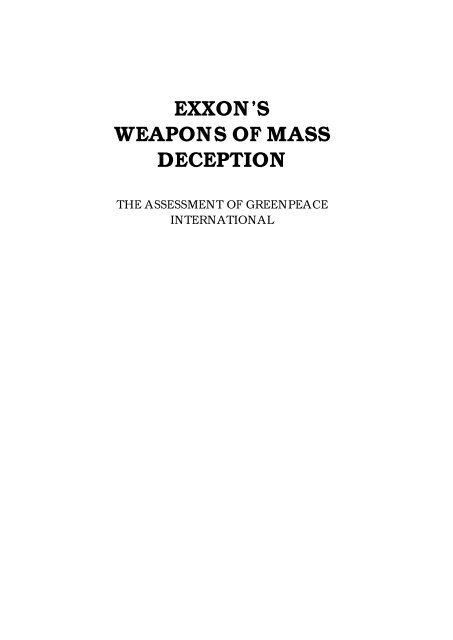

![[2007] EWHC 311 - Greenpeace UK](https://img.yumpu.com/22079793/1/184x260/2007-ewhc-311-greenpeace-uk.jpg?quality=85)

